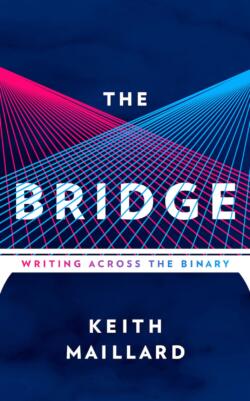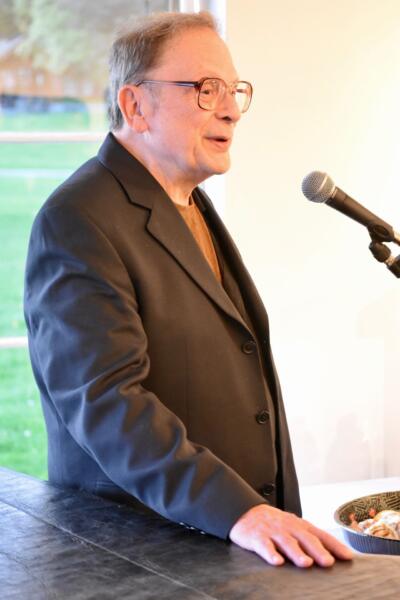1472 Girl interrupted … or imagined
The Bridge: Writing Across the Binary
by Keith Maillard
Calgary: Freehand Books, 2021
$22.95 / 9781988298788
Reviewed by Daniel Gawthrop
*
 In the imaginative universe that inspired this book, the metaphor of “the bridge” offered Keith Maillard two related themes worth exploring: the socially-constructed divide between the sexes that his younger self struggled for years to negotiate, and the gulf between childhood confusion and adult comprehension of what we now understand as gender. Literally speaking, the bridge represented that crossing on the Ohio River where he grew up, a span separating the author’s family home from the downtown hub of Wheeling, West Virginia. Recalling this black-and-white world of 1940s and 50s America, Maillard transports us back to his childhood — a forbidding time and place where it was dangerous to openly question one’s own gender.
In the imaginative universe that inspired this book, the metaphor of “the bridge” offered Keith Maillard two related themes worth exploring: the socially-constructed divide between the sexes that his younger self struggled for years to negotiate, and the gulf between childhood confusion and adult comprehension of what we now understand as gender. Literally speaking, the bridge represented that crossing on the Ohio River where he grew up, a span separating the author’s family home from the downtown hub of Wheeling, West Virginia. Recalling this black-and-white world of 1940s and 50s America, Maillard transports us back to his childhood — a forbidding time and place where it was dangerous to openly question one’s own gender.
For readers too young to have lived through this grimly oppressive epoch, it’s a frightening place where boys and girls, almost from infancy, were indoctrinated in the expected behaviours of gender; a simple time when “you could tell people by their clothes.” Maillard recalls the many problems he encountered as the result of feeling he ought to have been born a girl. In retrospect he attributes his predicament, at least in part, to nurture-versus-nature consequences: he was only a year old when his parents separated and his father abandoned him, his grandmother becoming more of a masculine presence in young Keith’s life. Mabel Idona Thomas sat him down to share stories of her father’s river boat he never tired of hearing:

In the train, he’d take me down with the engineer, and I’d stand there with the engineer, and we’d ride to West Wheeling and get on Dad’s boat. We carried nails and tobacco. The boats were very small, built with a pilot house and a cabin. We were always up in the pilot house, had to stay where Dad could see us, you know. I pretended I was steering the boat…
Mabel also taught the boy how to sew. As he became more interested in fabrics, soft textures, and the exquisite sensitivity of ballet dance, young Keith grew less interested in boyish pursuits like sports. On the baseball pitch, people tell him he throws “like a girl.” He gets good grades in school, “just like a girl,” and sits in the front of the class with the top students — all girls. There are whisperings about his “prissiness.” By age nine he has become a loner and, in the pre-television days when public libraries were a refuge for such solitary souls, he buries himself in science fiction. “I had no real friends,” he recalls, “and the characters I was meeting in books were more important to me than real people.”
By age eleven — long after he has learned the physical differences that define the sexes — his continuing effeminacy begins to alarm his mother, so she ships him off to an all-boys military school to make a man out of him. Before long, he is sufficiently brainwashed in the ideology of orthodox virility that, by his early teens, he has adopted hyper-masculinity as a mask for his own insecurity. Earnestly overcompensating, he completely buys into the “bells, bulls, and balls” machismo of the Ernest Hemingway novels he lustily gobbles up:
I loved the Hemingway code — that a man keeps his mouth shut and gets on with it — loved Papa’s nerve-shattered soldiers, battered boxers, and washed-up bullfighters who never lose their courage. Unlike the critics, I didn’t think that the protagonist of Across the River and Into the Trees was a gassy old wind-bag full of shit; I thought that he was a mature man full of hard-won wisdom.
*

Is any of this as stunning as the dust jacket promises? Hardly. Twentieth century and post-millennial literature are rife with coming-of-age stories, in both fiction and memoir, that explore the challenges of gender confusion and resolution. Some of the best come from the canonical margins, otherwise known as queer lit. From gay classics like Edmund White’s A Boy’s Own Story to the contemporary On Earth We’re Briefly Gorgeous by Ocean Vuong, or trans lit from Jan Morris’s Conundrum to Vivek Shraya’s I’m Afraid of Men, the territory of lives at risk due to non-conforming gender behaviour has been well trod, to say the least. Maillard, if he’s been paying attention, must know this.
So then why choose the “non-binary” as subject matter at this stage? After sixteen books of various genres and interests, is the cis-male, heterosexual, married father of two just being trendy? I doubt it. Nor does Maillard — turning eighty this year, a senior professor in UBC’s much beleaguered Creative Writing department — seem a likely candidate for late-life pronoun change. (I can imagine the grammarian in him even bristling at the third-person plural for his own personal choice.) No, I suspect the real reason is contained in the book’s sub-title: by focusing on writing — as opposed to just living — across the binary, Maillard is telling us that the very act of writing his way through gender was ultimately what freed him from its restrictive, all-too-confining boundaries.
The writing, we learn, got off to a rough start. Maillard recalls his earliest scribblings as the typical juvenilia of male adolescence, with lots of fight sequences inspired by films like Blackboard Jungle and Rebel Without A Cause. Regarding a sex scene he wrote as a virgin at seventeen — and the fact he closed off the climactic moment with “We both went wild”—today’s Keith admits he was cheating with shorthand to make up for lack of experience. When the adult Keith shares an actual sex scene from his own life after he’d written that purple prose, the result is a tender recollection of heterosexual bliss achieved without succumbing to “the nasty barrier of frustration” that, for a 1950s “rebel” male, often required non-consensual, penetrative sex to relieve. After reading the works of Kerouac, Snyder, and Ginsberg, he conceives of a “Supergirl” character, Butch Carlyle, who — written in the first person — has heroic, pre-feminist agency that empowers her creator. And here The Bridge really takes off.
There are moments when Maillard’s conception of the world seems at odds with his understanding of the non-binary. As a tenured academic he’s up to speed on contemporary influences, as conversant in Eve Kosofsky Sedgwick’s defense of feminine boys as in Kathleen Hanna’s Riot Grrrl Manifesto or seminal texts such as Judith Butler’s Undoing Gender. But the actual world of trans women appears just as alien to him as to the average binary male. “In order to want to be a girl,” he says early on, “you have to be certain that you’re not one already” (contradicting a central tenet of trans theory, which regards birth-assigned gender as a mistake). If trans readers wince at Maillard’s use of the discredited “transsexual” in reference to surgery, they will surely groan at his accounts of dressing up as a girl — first in the Third Grade and later at age fourteen — for Halloween: the safest, easiest, most commitment-free way for any boy to do drag. Similarly, his claim to have experienced gender dysphoria—a psychiatric term applied mainly to trans people —seems overstated, given what he offers as evidence. In the end, many readers may conclude that young Keith was just an exceptional nerd: a geek, that category of outcast which, in boys, has often found expression in feminine ways. Lots of male loners who become intellectuals — straight, gay, bi, non-binary — have experienced this same gender ambiguity, not dysphoria, as a rite of passage.

But none of this really matters, for there are two qualities that keep one reading The Bridge right to the end. The first is an almost Zelig-like narrative sweep that, if it doesn’t exactly place Maillard in many of the West’s defining cultural moments of the second half of the twentieth century — libertarianism, the Beat poets, McCarthyism, domestic opposition to the war in Vietnam — is impressive in how it charts the author’s evolving understanding of gender through disillusionment as a result of these events (most notably, the misogyny of many of the anti-war movement’s male leaders). There are curious omissions. He riffs on the homophobia of McCarthyism and J. Edgar Hoover’s FBI, for example, without mentioning the self-loathing Roy Cohn or Clyde Tolson, the closeted gay right-hand men to those pivotal right-wing figures, or the closeted Hoover’s infamous transvestism. But Maillard’s larger purpose — creating more understanding about the limitations of gender — transcends such oversights, making The Bridge a worthy undertaking. The second quality is Maillard’s prose: his gift for the scene-setting aspects of storytelling is first rate. His non-binary world is physical and tactile, with descriptions that sizzle off the page — particularly reminiscences capturing the harsh realities and rugged surroundings of his West Virginia childhood. (One passage recalling the distinctive smell of dance schools lingers, even as I write.) The struggle to arrive at his own personal understanding of gender is well drawn through various friendships and influences, the arc of his relationship with much-loved cousin Billy especially heartbreaking.
Toward the end of The Bridge, Maillard pauses to explain himself. “This book is a severely focussed memoir, not my autobiography,” he writes, “and there is much that I am intentionally leaving out…” It seems an unnecessary authorial intrusion: Maillard’s readers are sophisticated enough to understand what he’s up to here, and if they’ve gotten this far they already know he’s engaged in a subtle form of selective truth-telling that makes this a decent memoir. Even if it turns out he’s been fooling us — even if “The Bridge” secretly represents the distance between memoir and fiction, and he’s been straddling that line all along—then he has given us a cracking good read while doing so.
*

Daniel Gawthrop is the author of five non-fiction books including The Rice Queen Diaries (2005) and The Trial of Pope Benedict: Joseph Ratzinger and the Vatican’s Assault on Reason, Compassion, and Human Dignity (2013), both published by Arsenal Pulp Press. His first novel, Double Karma, will be published in Spring 2023 by Cormorant Books. Editor’s note: Daniel Gawthrop has also reviewed books by Hassan Al Kontar and Cheryl A. MacDonald & Jonathon R.J. Edwards for The British Columbia Review.
*
The British Columbia Review
Publisher and Editor: Richard Mackie
Formerly The Ormsby Review, The British Columbia Review is an on-line journal service for BC writers and readers. The Advisory Board consists of Jean Barman, Wade Davis, Robin Fisher, Cole Harris, Hugh Johnston, Kathy Mezei, Patricia Roy, Maria Tippett, and Graeme Wynn. Provincial Government Patron (since September 2018): Creative BC. Honorary Patron: Yosef Wosk. Scholarly Patron: SFU Graduate Liberal Studies.
“Only connect.” – E.M. Forster































6 comments on “1472 Girl interrupted … or imagined”